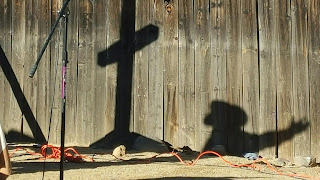Messianic Misunderstandings (Luke 7:18-35)
Journey with Jesus to the Cross (Tuesday, March 15)
Read Luke 7:18-35
John was confused about Jesus. After announcing him as the Messiah, two things mystified him. Why didn’t he gather a rebellion to overthrow Rome? And why hadn’t he rescued him from Herod (Luke 3:18-19)?
Jesus uses John’s confusion to make some confusing statements of his own regarding his identity and mission. Luke uses the whole episode to highlight the vital question: who does Jesus think he is? Let’s take a careful look at this interchange….
Jesus responds cryptically to John’s question: “Go and tell John what you have seen and heard….” He then recites a litany of miracles filled with Old Testament allusions to the coming of the Holy One to Israel (Isa 29:18-19; 35:3-6): “the blind receive their sight, the lame walk,” etc.
The cryptic comments continue as John’s messengers leave. Jesus asks the crowd about John. Who did they think he was? “A reed shaken by the wind…? A man dressed in soft clothing…? A prophet?”
Jesus cannot challenge Herod directly, or he will be put in jail just as John was. But the symbol on Herod’s coins (which, by the way, were the only form of mass media communication in the ancient world, and thus of great symbolic importance) was of Galilean reeds blowing in the wind.
This, together with references to clothing, luxury and kings’ courts, assures us that Jesus is using coded language to speak of Herod, the hated and false king of Israel. In an oblique manner, then, Jesus does challenge Herod’s authority.
Continuing, Jesus affirms that John was not just a prophet; he was himself the fulfillment of one of the most important prophecies in the Hebrew Scriptures. Jesus quotes directly from Malachi 3:1: “Behold, I send my messenger before your face….”
Stay with me here, for this is important. The Malachi prophecy clearly states that the messenger will prepare the way for the Lord. Not the Messiah, but the Lord, Yahweh, the God of Israel.
You see, no one expected the Messiah to be the embodiment of Israel’s God. Everyone thought the Messiah would be a Deliverer sent from God. But Jesus (and Luke, by including this story here) wants us to see that, as Israel’s Messiah he isn’t merely the promised Deliverer. He is in fact the embodiment of Israel’s God. He has returned to Israel to restore the temple, to claim his rightful place as King of Israel, and to establish the kingdom of God on earth.
A new day is dawning, Jesus is telling us. The kingdom of God is here. The rule of Herod is small change compared to the powers of evil and death behind the rulers of this world. But see what is happening: the dead are raised, the blind are healed, the poor hear the good news. The Lord (Jesus himself, the Embodied God) has returned to Israel. “Blessed is the one who is not offended by me” (23).
John was the greatest person under the old order (28). But now that the promised kingdom has arrived through Jesus, even the least of us is more blessed than John. For we have seen what John promised. It’s no longer the time for mourning; it’s time for a dance! Strike up the band, join in the song, everyone is invited. Let’s celebrate (31-34)!
“Lord, sometimes I’m as confused by you as John was. Give me wisdom and faith, and a joyful heart in the midst of day-to-day challenges. For despite how I sometimes feel, the truth remains: Jesus is King of kings and Lord of Lords. And that makes all the difference in the world."
Continuing, Jesus affirms that John was not just a prophet; he was himself the fulfillment of one of the most important prophecies in the Hebrew Scriptures. Jesus quotes directly from Malachi 3:1: “Behold, I send my messenger before your face….”
Stay with me here, for this is important. The Malachi prophecy clearly states that the messenger will prepare the way for the Lord. Not the Messiah, but the Lord, Yahweh, the God of Israel.
You see, no one expected the Messiah to be the embodiment of Israel’s God. Everyone thought the Messiah would be a Deliverer sent from God. But Jesus (and Luke, by including this story here) wants us to see that, as Israel’s Messiah he isn’t merely the promised Deliverer. He is in fact the embodiment of Israel’s God. He has returned to Israel to restore the temple, to claim his rightful place as King of Israel, and to establish the kingdom of God on earth.
A new day is dawning, Jesus is telling us. The kingdom of God is here. The rule of Herod is small change compared to the powers of evil and death behind the rulers of this world. But see what is happening: the dead are raised, the blind are healed, the poor hear the good news. The Lord (Jesus himself, the Embodied God) has returned to Israel. “Blessed is the one who is not offended by me” (23).
John was the greatest person under the old order (28). But now that the promised kingdom has arrived through Jesus, even the least of us is more blessed than John. For we have seen what John promised. It’s no longer the time for mourning; it’s time for a dance! Strike up the band, join in the song, everyone is invited. Let’s celebrate (31-34)!
“Lord, sometimes I’m as confused by you as John was. Give me wisdom and faith, and a joyful heart in the midst of day-to-day challenges. For despite how I sometimes feel, the truth remains: Jesus is King of kings and Lord of Lords. And that makes all the difference in the world."
